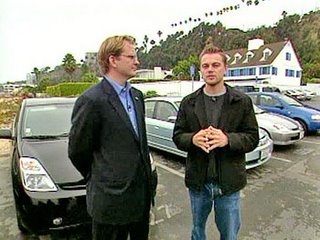Salvation Through Spending
 scientists talking about how dire of an issue global warming is. The piece highlighted how human activity is exhausting the natural environment's ability to regulate itself and provided simple ways we all can help slow down global warming and save our planet. The Top Three Things to Stop Global Warming are:
scientists talking about how dire of an issue global warming is. The piece highlighted how human activity is exhausting the natural environment's ability to regulate itself and provided simple ways we all can help slow down global warming and save our planet. The Top Three Things to Stop Global Warming are: - Drive an energy-efficient car
- Buy energy-efficient appliances
- Use energy-saving light bulbs
I have a problem with this. All three of these options require consumption; not only consumption, but heavy consumption. Consumption isn't the answer; it's the problem. Purchasing our way out of environmental degradation is like waging war for peace. The overarching consumptive world view that is prevalent throughout nearly every country (and not just the "First World," but also China, Zimbabwe, Chile, etc.) is at the core of the global warming crisis. In this country the issues are compounded by one important issue: Gross Domestic Product (GDP). GDP is the most widely used indicator of the national economy, as it is the annual aggregate production of all goods and services in a country. GDP does not necessarily indicate the economic well-being of a country since activities that are detrimental to the long-term economy (like deforestation, strip mining, over-fishing, murders, terrorism) increase today's GDP. Therefore environmental degradation is rarely accounted for in GDP calculations. A classic example is the infamous Exxon Valdez oil spill, which showed up as a net economic gain in the US because of the expenditures associated with the clean-up effort. These expenditures outweighed the eleven million gallons of oil spilled into Alaskan waters.
The bottom line is that not all growth is good. Just as the wrong form of uncontrolled human growth, cancer, can be damaging and even fatal, so can the wrong sort of economic growth. I'm a firm believer that as a people we need to be smarter about our consumption habits. I herald Oprah for bringing the issue of environmental degradation to the table and for providing options. They are good options, but the most appropriate first step is questioning whether we need anything more. Do we need a new car, a dishwasher, 37 light bulbs? The order is Reduce, Reuse, Recycle. As a country we have a long heritage of thriftiness and penny pinching. If only we could flex our ingenuity and be more discernable about whether we need to purchase something new.


0 Comments:
Post a Comment
<< Home